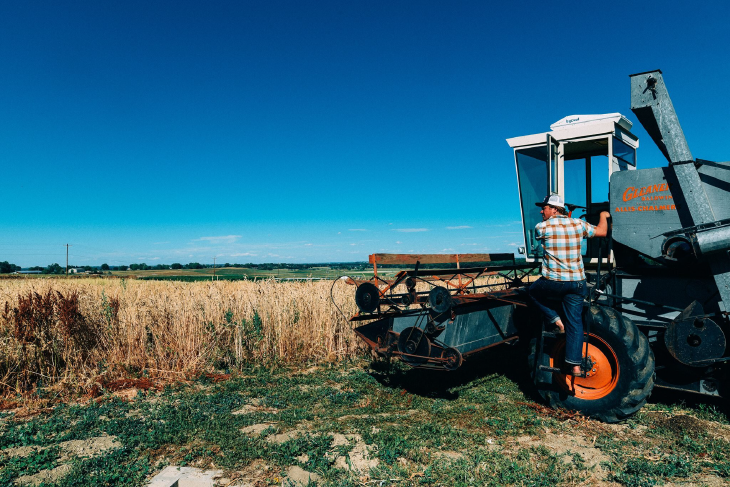Every farmer has a different set of opportunities and challenges. For some, a community of like-minded farmers is all that is needed to revolutionize their operation. The catalyst for others can be markets that reward their stewardship of land. Some need an integrated farm plan that brings clarity and technique to their vision. Mad Agriculture meets farmers on their journey, helping them thrive in making a living growing plants and raising animals in relationship with their place.
The Perennial Fund offers a new type of loan to help farmers expand certified-organic acreage using regenerative practices. This new source of farm finance is born out of the frustration that banks and the Farm Bill don’t effectively support the stewards of the land. We believe that farming families and rural communities dedicated to organic agriculture deserve deeper support and equitable sharing of risk when producing healthy food and ecological benefits for all people to enjoy.
Why We Partner
We believe that we should put our money where our mouth is. That means that the financial investments of Shockwave don’t just sit in the usual indexes of stocks and bonds.
The Perennial Fund is a catalytic capital investment in organic and regenerative agriculture transforming climate change, financial inclusion for farmers and farmer equity.
Impact
Perennial is based on the idea that small and mid-sized farmers are unable to successfully transition to organic and regenerative practices with existing financing mechanisms and buyer demands. Industrial and extractive agriculture has diluted food systems, added to climate consequences and stripped away farmer equity. This innovative Fund is propped up to revolutionize organic and regenerative agriculture for mid-sized farmers focused on row crops. The Fund intends to do so through flexible capital, technical assistance and supply chain support.
Agriculture and Quality Food Additionality
All farmers that Perennial intends to lend to will have acquired USDA Organic certification on a portion of their land. Perennial’s loan will allow farmers to purchase the equipment, take initial losses and convert more land to organic or organic regenerative practices. The goal is for 100% of farmers to achieve USDA Organic certification on the transitioning acres and a minimum of 50% of farmers to achieve R.O.C. While that is the minimum percentage, the team hopes to have 70-80% of acres achieve R.O.C.
Regenerative and organic practices increase access to healthy produce that is free from toxins and has a significant opportunity to decrease the health burden on the American public. R.O.C., while a more nebulous term than Organic, is believed by Mad Agriculture to produce higher quality food and develop natural cycles of ecological systems, leading to on-farm improvements. Through their own experiences, Mad Ag believes that regenerative practices such as no-till, strip till, over crops, nutrient management, mulching and compost show that as these practices were adopted, the bottom line improved across various regional ecosystems
Farmer Livelihood and Equity
Perennial is focused on meeting traditionally underserved farmers and enhancing farmer livelihood. The transition to organic and regenerative practices produces a financial gain and adds supplier power to the farmer; however, the journey to get there is full of rejections to operating loans, purchase of crop insurance and securing government subsidies. Conventional methods result in tighter margins and greater competition. Organic and regenerative row crop farmers endure more stability with buyer partnerships, but these partnerships are hard to acquire for rural farmers lacking the relational capital. As mid-sized farmers tend to typically get squeezed out of the supply chain for Organic, Perennial intends to bridge the gap by connecting mid-sized row crop farmers to the premium buyers of these crops.
Climate Impact Perennial identifies
Perennial identifies agriculture as a key contributor to climate change acceleration in the United States. “Annually, agriculture in the U.S. is releasing 8.2 MMT CO2, 248.7 MMT methane, and 285.2 MMT nitrous oxide, contributing 9% of total U.S. GHG emissions. Estimates suggest that mitigating the effects of global climate change could save the United States $10 trillion and hundreds of thousands of lives.” Perennial shows that the ‘true cost’ of conventional farming, when accounting for biodiversity loss, water depletion, soil degradation, air pollution and greenhouse gases, is up to 2x that of organic and regenerative. The team believes it will have an impact on global climate change mitigation through the regenerative management of the land, which promotes carbon sequestration and a decrease in the amount of nitrogen fertilizers. Reducing the amount of carbon and nitrogen that agriculture releases into the air is the most effective way for the industry to slow global climate change. Additionally, technical assistance and education on water usage will compound the magnitude of climate mitigation.
